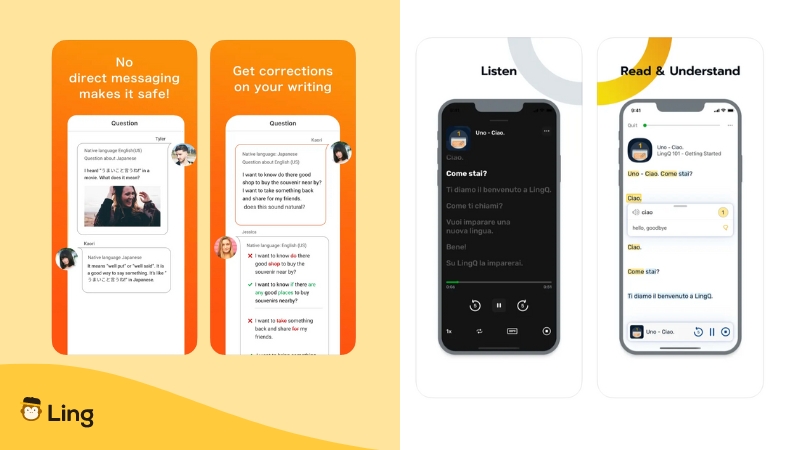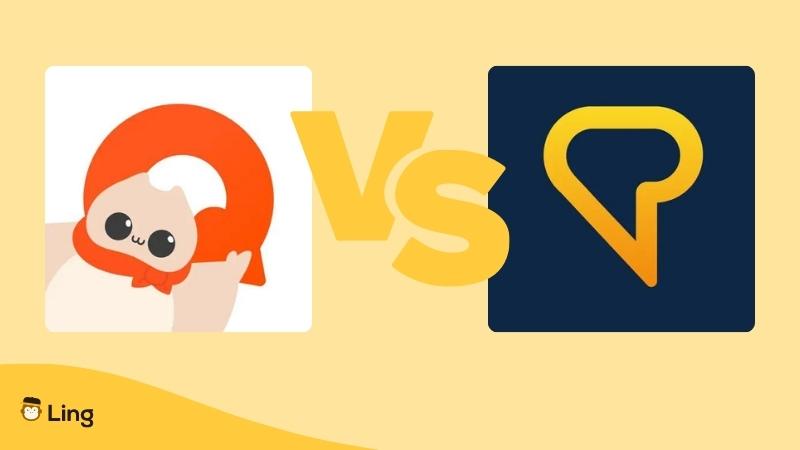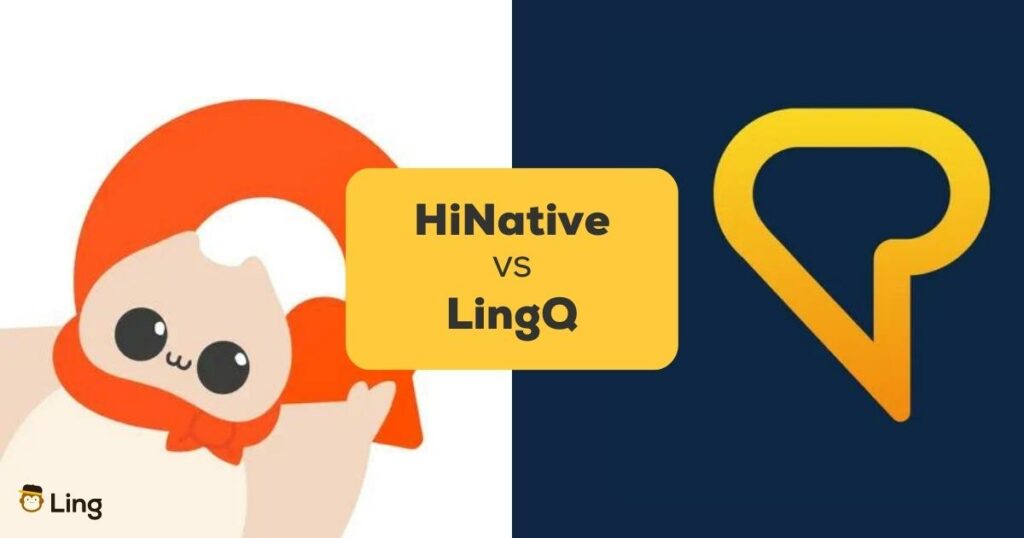Attention language learners! In this article, we’re looking at HiNative vs LingQ. The language-learning app market is full of helpful resources to turn you from a language-learning zero to a language-learning hero. HiNative and LingQ are two more exciting additions to the market.
So, regarding language-learning options, HiNative and LingQ are two of the top competitors. They both have their pros and cons, you know?
HiNative is this awesome global language-learning community where you can connect with native speakers in real time. It’s super cool because you can ask questions and get answers from experts who know all about the culture you’re learning about. On the other hand, LingQ is great because it includes many reading materials and helps you improve your vocabulary while learning a new language.
In this comparison, we’ll look at the pros and cons of HiNative and LingQ. We’ll also dive into their various approaches to learning, user interfaces, pricing plans, and their effectiveness in helping you learn a new language. So, when you break down each app, they can choose the one that suits your needs and interests the best.
HiNaive Vs LingQ: A Quick Glance
| HiNative | LingQ |
|---|---|
| 113 available languages | 45 available languages |
| Communicate with native speakers from over 170 countries by asking questions and receiving responses in their original tongue! | There are over a thousand lessons with supporting audio and written content, also using a great tool like SRS Review for learning new vocabulary. |
| 1-Month Premium Plan: $5.68 (7-day free trial) 12-Month Premium Plan: $59.63 (7-day free trial) | 1-month Premium Plan: $12.99 6-month Premium Plan: $71.94 12-month Premium Plan: $107.88 24-month Premium Plan: $191.76 |
About HiNative
HiNative is a unique product on the market, and it’s difficult to think of many other language-learning apps that replicate it. HiNative is fundamentally a question and answers app, similar to Quora, however, focusing only on languages and culture. You become an expert in your native language(or second languages you have learned) and offer answers in your natural expertise.
It is not just a copy of Quora, though. It improves some elements of the question-and-answer format by offering question templates, so those who don’t quite know how to formulate their question can contribute.
About LingQ
LingQ is best used as a reading platform for B1-C2 learners. It is possible to learn a language from scratch by reading, but it isn’t easy, especially if you don’t know the alphabet.
LingQ takes its name from its spaced repetition flashcards system. Any words you don’t understand are marked as LingQs, and you can test yourself on them at a later time.
Design And Interface
We’ll start with a review of the application’s user interfaces. Even if the content is crucial, the design and interface can significantly enhance the ease of use and the quality of the learning experience. Imagine the poorly designed applications; it would be impossible to concentrate on the lessons, right?

HiNative
The HiNative app’s minimalistic design and intuitive UI speak for itself. Considering the nature of a Q&A app, the user interface should be as uncomplicated. In this regard, HiNative succeeds admirably. Everything is clean and easy to read. There is nothing complicated about the website or the app.
LingQ
It has been noted that LingQ’s user interface is quite plain. Though it’s not essential, LingQ’s poor visuals are noticeable compared to other language-learning apps. In fact, the whole thing looks a touch dated and is a bit clumsy to use. So, is it simple to use? The answer is yes. This dull appeal, however, can potentially decrease learners’ engagement and make them tired of learning.
Courses/Available Languages
HiNative
If you look on Google PlayStore, HiNative says: Ask any questions about English, Korean, Japanese, Spanish, French, Chinese, Russian, Arabic, Portuguese, German, Italian, and over a hundred other languages and dialects.
Although this is true, many lesser-known languages have far fewer subscribers, and finding a suitable answer, or any answer, might be difficult. Additionally, the app appears to prioritize the following languages:
| English (US) | Portuguese (Brazil) | Simplified Chinese |
| French (France) | Portuguese (Portugal) | Traditional Chinese |
| German | Spain (Mexico) | Japanese |
| Italian | Russian | Korean |
| Polish | Turkish | Vietnamese |
LingQ
You can start studying your desired language now with LingQ, which supports more than 40 languages.
| English | French | Spanish | Japanese |
| Italian | German | Russian | Simplified Chinese |
| Portuguese | Swedish | Korean | Traditional Chinese |
| Dutch | Polish | Greek | Finnish |
| Norwegian | Czech | Arabic | Hebrew |
| Turkish | Latin | Romanian | Esperanto |
| Ukrainian | Belarusian | Catalan | Bulgarian |
| Persian | Danish | Gujarati | Cantonese |
| Croatian | Hungarian | Armenian | Indonesian |
| Icelandic | Malay | Slovak | Serbian |
| Tagalog | Swahili | Afrikaans | Georgian |
| Slovenian |

Reading And Listening
The capacity to negotiate, influence, and persuade are all enhanced by an individual’s listening skills. Furthermore, disagreements and misunderstandings can be avoided. Learning to read, and becoming a better reader, relies heavily on our ability to listen attentively. And you can’t succeed at learning a new language without all of these!
Given that reading and listening are essential components of effective communication. It aids our linguistic and interpersonal development, as well as our academic and professional achievements. We’ll check out the reading and listening comprehension tools in apps like HiNative and LingQ to see if they’re worth your time!
HiNative
HiNative is a lively place where language learners can ask each other questions and share insights about their chosen languages. However, subscribe to the Premium version if you want to listen to more audio files. Also, as it’s a Q&A language app, you will only get a little opportunity to practice reading passages more than long-length readings, such as articles.
LingQ
LingQ is a useful language-learning tool for improving reading and listening comprehension. With so many options, learning your target language has never been more accessible. Furthermore, since articles can be imported and read on LingQ, it is a superb immersion-based platform perfect for independent learners.
In particular, it provides transcripts for 1000+ hours of downloaded audio recordings. That’s right; now, you can improve both skills simultaneously!

Speaking And Writing
Communicating effectively both orally and in writing is important. It makes people feel connected, committed, and respected. It’s a great way to boost output and effectiveness. It also reduces the potential for confusion and error. Therefore, the ability to speak and write is crucial for language learning. How others think of your intellect is partly shaped by how effectively you write and talk; nevertheless, they are both skills that can be enhanced further.
Here, we’ll compare HiNative and LingQ to determine which has the better tools for enhancing your proficiency in the target language, in speaking and in writing.
HiNative
Since it is a Q&A language app, it’s perfect for interacting with native speakers and studying with other language learners. This implies you can inquire about the structure of the piece of text. Aside from that, the app serves as a Q&A forum for language learners to interact with native speakers and have their pronunciation or sentence construction reviewed.
However, remember that the app can be lacking in certain features if you do not subscribe to the Premium version.
LingQ
LingQ can help you with reading and listening comprehension, but it won’t help your speaking. You can use LingQ to read more, even though the app prioritizes reading and listening assistance and treats speaking and writing as afterthoughts. Simply increasing your reading can help you become a better writer.
Pricing Plan
HiNative
HiNative has a free and Premium version. The premium version is $5.68/month or $59.63 manually (that saves you about 50 cents a month).
| 1-Month Premium Plan | 12-Month Premium Plan |
|---|---|
| $5.68 (7-day free trial) | $59.63 (7-day free trial) |
For faster service from more people, “Priority Tickets” are available with the premium subscription. With a Priority Ticket, your inquiry will be shown before other users. Therefore, the more the exposure of your query, the greater the potential volume of responses. Priority tickets typically cost $15 for a bundle of 5, but with HiNative Premium, you get 10 monthly tickets in addition to other Premium perks.
Therefore, with the Premium features, you can access unlimited character reading support (including Japanese and Chinese), translate any message anytime, make your queries stand out, play other users’ audio/video responses, and many more!
LingQ
There are free, premium, and premium plus versions of LingQ. One month, six months, twelve months, and twenty-four months are all options.
| Premium | Premium Plus |
|---|---|
| 1-month Plan: $12.99 6-month Plan: $71.94 12-month Plan: $107.88 24-month Plan: $191.76 | 1-month Plan: $39.99 6-month Plan: $233.94 12-month Plan: $431.88 24-month Plan: $839.76 |
There are thousands of hours of audio available with transcripts, but only 1 audio playlist and the ability to store 20 words or phrases are included in the free version. However, you can’t use them offline. In contrast, the Premium Plan provides limitless of those, and you have offline accessibility.
The Premium Plus Plan offers what exactly, though? Access to all of these features, as well as live tuition, writing correction, and premium courses, are included in the Premium Plus plan.

Pros And Cons
HiNative
Pros
- The question template is useful for getting people to order their words and thoughts
- The app has its own internal economy of points and rewards
- Simple and effective User Interface
- Allows cultural exchange in a way other non-community apps don’t
Cons
- Some of the questions are pointless, and users would be much better suited to using Google Translate
- Repeat answers. Sometimes you see a simple question answered multiple times.
- Doesn’t give you the fundamentals of how to learn a language
LingQ
Pros
- The community voted for top translation, as opposed to Google translate
- Known word counter’ tracks progress
- LingQ’s are a great way to create flashcards for new words
- You can upload Youtube and Netflix videos and integrate them into lessons
- Tutoring service(extra cost)
- Language exchange in the community tab
- Wide choice of languages
- There is no ceiling for progress. You can keep uploading more and more advanced material
Cons
- Bugs with some flashcards. A target language is sometimes presented before you have a chance to guess it.
- Messy User Interface (even worse on the mobile app)
- More expensive than similar apps
- A free version is almost unusable(You get a max of 20 LingQs)
- Apps like Duolingo and Ling are better for beginners
Conclusion
If this review of HiNative vs LingQ hasn’t been made clear so far, HiNative and LingQ are very different language-learning apps.
With LingQ, you could feasibly start with very little knowledge of your target language and get to the point of reading and listening mastery(speaking and pronunciation are something different).
This would be impossible on HiNative, and to be fair to them, they don’t market themselves this way either. HiNative is a handy aide to have on your language learning journey. That being said, I’m not sure I’d be willing to pay $60 a year for something that Reddit and Quora already do (albeit not as well).
As a general point, I think it’s critical somewhere along the way to connect with native speakers of your target language. Without sounding too mercantile, learning a second language is expensive. You can spend $1000’s per year paying a teacher to answer your questions and practice your speaking. If you can make friends with someone in a language exchange, you save a lot of money and have a point of contact if you ever decide to travel to that country and get even deeper into the culture.
Our Ultimate Decision:
LingQ – If you’re serious about learning a language.
I like HiNative, and the free version is good, but it doesn’t offer me enough of an alternative to other free, more popular websites.
Learn More Languages With Ling! The Best Alternative
Learning a new language is a fascinating journey to take.
I’ve reviewed many of these apps now, and although there’s no magic bullet to learn languages fast, I feel Ling is about as close as you can get to an app that will take you from beginner to advanced in a foreign language.
It is a Duolingo-style app, but it accomplishes something DuoLingo doesn’t, offering high-quality content in lesser-known languages. As you can see from some of my other blogs, like Names and Nicknames in Lao and Sorry in Albanian, we focus on those languages that deserve more recognition.
Come over to our website and try our language courses today.
Updated information by Mei



































































